
From federal agents to security guards, our popular imagination is captivated by the action-packed days of our front-line defenders in criminal justice. Of course, there’s much more to criminal justice than what occurs in action movies.
Criminal justice is a vast range of disciplines that seeks to uphold justice and order in a variety of ways.
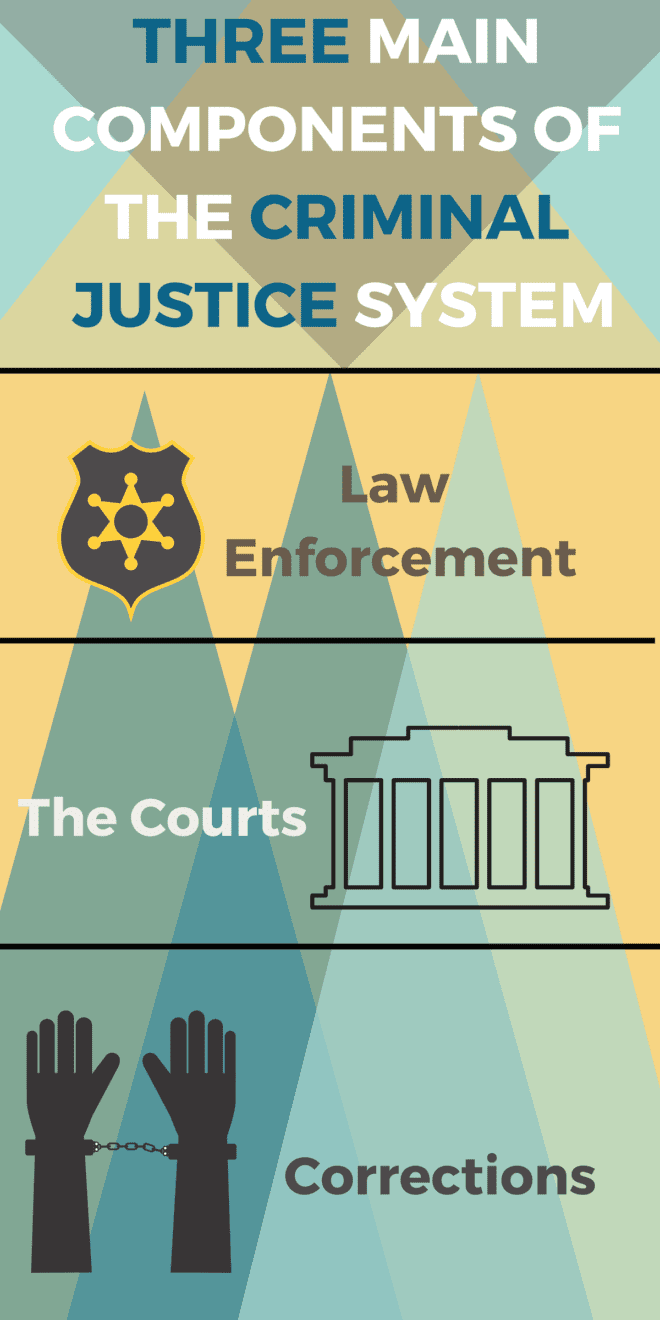
There are three main elements to the criminal justice system:
- Law enforcement
- The Courts
- Corrections
All three are crucial for keeping the public safe, determining just punishments for those who have broken the law, ensuring the serving of the sentence, and ensuring the rehabilitation of those incarcerated.
Just think of all the people that play some part in the above system. The Federal Department of Justice itself has well over 100,000 employees, while police departments employ over 1 million officers (not counting other roles).
If you feel yourself drawn towards solving problems that have real social effects, you may be a great fit for working in criminal justice. No matter what your skillset is, there’s likely a role somewhere in the system that you are a great fit for. From special agents to psychologists, and from paralegals to social workers, many fields work in tandem to ensure quality outcomes in our criminal justice system.
Here at DegreeQuery, we’ve covered all sort of online education-centered topics including criminal justice. Already know what criminal justice question you would like answered? Check out our Criminal Justice FAQs below:
- What is the Difference in a Degree in Legal Studies and Criminal Justice?
- What classes will I take in a Criminal Justice Degree?
- How fast can I earn a degree in Criminal Justice?
- What is a Bachelor’s Degree in Criminal Justice?
- What is the Benefit of a Degree in Crime Analysis vs. Fraud Analysis?
- What Degree Do I Need to Be a Crime Analyst?
- What Degree Do You Need to Be a Private Investigator?
- What Salary Can You Expect With a Master’s Degree in Criminal Justice?
- What Are My Degree Choices in Fraud Analysis?
To see all of our Criminal Justice content, head here.
So what is a Criminal Justice Degree?
If you’re still with us, you’re probably looking for a more detailed dive into criminal justice degrees and opportunities.
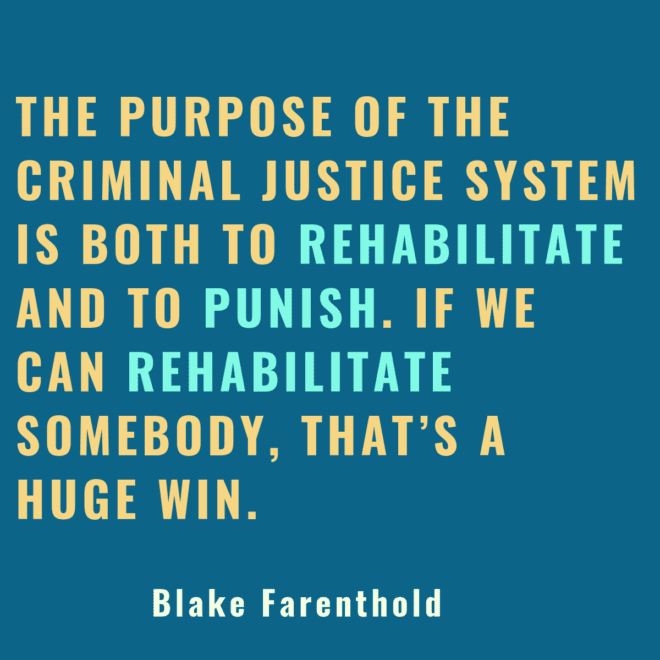
Starting with the basics, criminal justice is a multidisciplinary field covering theoretical and practical aspects of policing, the court system, and the corrections systems. Criminal justice degrees are available at the associate’s through doctoral levels. Those with degrees at any level in criminal justice are in high demand.
At a bachelor’s level, criminal justice degrees cover a variety of topics, including but not limited to:
- Research methods
- Statistics
- Policing
- Civics nd the U.S. Court System
- Corrections
- Criminal Procedure
- Criminal Law
- Victimology
- Juvinile justice
- Criminal Courts
- Psychology
- Cyber Crime
- And a host of related electives.
The study of criminal justice initially emerged at the university level in the 1920s. By the 1950s, less than 1,000 students studied criminal justice in universities, though related fields of sociology and criminology continued related research. While criminology is now a part of some criminal justice curricula, the field is distinct in that it is the study of non-legal aspects of crime. Where criminal justice studies the practical aspects of working within the criminal justice system, criminology studies the causes, patterns in, and ways to stop crime.
In the second half of the twentieth century, criminal justice degrees began to gain prominence. With the Civil Rights movement pushing U.S. courts to grant greater rights and protections to criminal defendants, a new class of “lawman” was needed.
Modern criminal justice degrees help to prepare well rounded, factually prepared, and analytically sound workers in the criminal justice system.
While that serves as a general description of criminal justice as an academic field, there are many particular degrees that one can pursue to gain criminal justice expertise. Below we’ll detail some of the specifics and differences between criminal justice degrees.
Associates in Criminal Justice Degrees
Associates degrees typically take 1.5-2 years to complete and generally follow the course of study of the first half of a bachelor’s level degree. They require 60 credit hours, exactly half of the credit hours required for many bachelor’s programs.
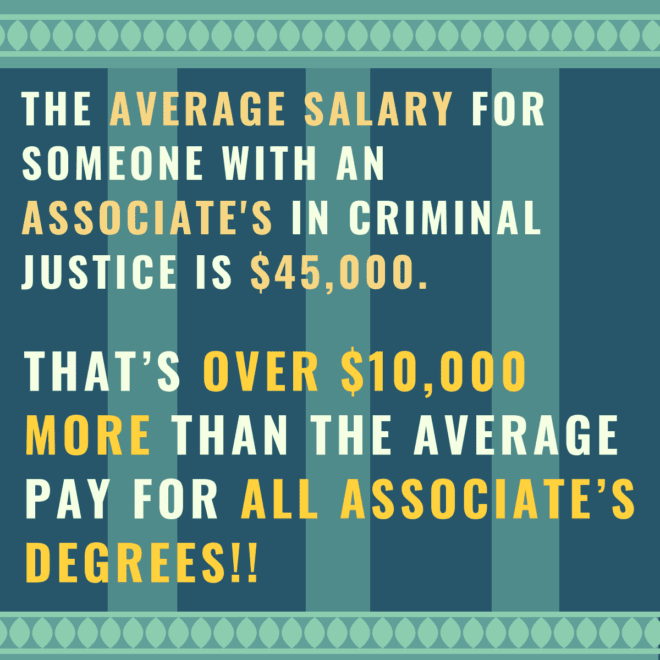
Courses in an associate in criminal justice degree often include a broad base of general education courses including English, basic college math, several science courses, and courses in history and the humanities. Additionally, the “major” component of an associate’s in criminal justice will often include courses in the following:
- Introduction to criminal justice
- Criminal law
- Criminal procedure
- Criminal investigation
- Ethics in criminal justice
- Policing
- Corrections
- Juvenile Justice
- And several electives
Many colleges offering associates degrees have many “transfer agreements” in place that enable students who successfully complete the program to continue their studies at a four-year college or university.
Community colleges are known to be one of the most cost-effective ways to obtain the first two years of your higher education. In several states and large metropolitan community college districts, tuition is even free!
For students “just” looking for an associates in criminal justice, there are many jobs available in criminal justice for those with a 2-year degree. Check out our criminal justice jobs section below for more information.
Bachelor’s in Criminal Justice
Bachelor’s in criminal justice are perhaps the most common and are found at many colleges and universities throughout America. Bachelor’s degrees generally require 120 credit hours that includes a broad “general education” selection of courses as well as courses in your major.
General education courses for criminal justice degrees generally include humanities, foreign language, some math, and some science. The reason criminal justice degrees also require courses in other subjects is so that those gaining degrees will be well-rounded, articulate, and critical thinkers.
Major courses in bachelor’s in criminal justice degrees will often include the following:
- Criminology
- Policing in America
- Courts and the Prosecution Process
- Corrections in America
- Research Methods
- Statistics
- Criminal Justice Ethics
- Security Administration
- Victimology
- Police Administration
- Alternatives to Incarceration
- The Juvenile Justice System
- Border Security
- And an Internship in Criminal Justice
Obtaining a bachelor’s in criminal justice can make you eligible for leadership positions in corrections and policing as well as prepare you to return to school at the graduate level for greater specialization.
If you think you might be interested in obtaining a bachelor’s in criminal justice degree, make sure to check out our ranking of the most affordable online criminal justice bachelor’s degrees today!
Master’s in Criminal Justice
The master’s level is where students truly begin to specialize in one area of criminal justice. There are a variety of different of master’s degrees that can lead to careers in criminal justice, including master’s in criminal justice, forensic psychology, social work, cyber security, homeland security, and others.
Master’s degrees typically take between 1 year (at an accelerated pace) and 5 years (at a part-time pace), with most students finishing master’s degrees in 2-3 years.
Master’s degrees commonly require a 100+ page thesis or a capstone project. A thesis is a compilation of current research in your field of study and is meant to show that you are up-to-date in your field as well as can think critically about the subject matter. Depending on the field the master’s degree is in, a supervised internship may also be a part of your course of study.
Some common specializations that occur in Master’s in Criminal Justice programs include
- Generalist
- Corrections and Case Management
- Forensic Science
- Homeland Security and Crisis Management
- Law Enforcement
Additionally, related degrees can lead to careers in criminal justice. These include
- Cyber Security
- Forensic Psychology
- Law
- Public Health
- Homeland Security
- Social Work
- And Others
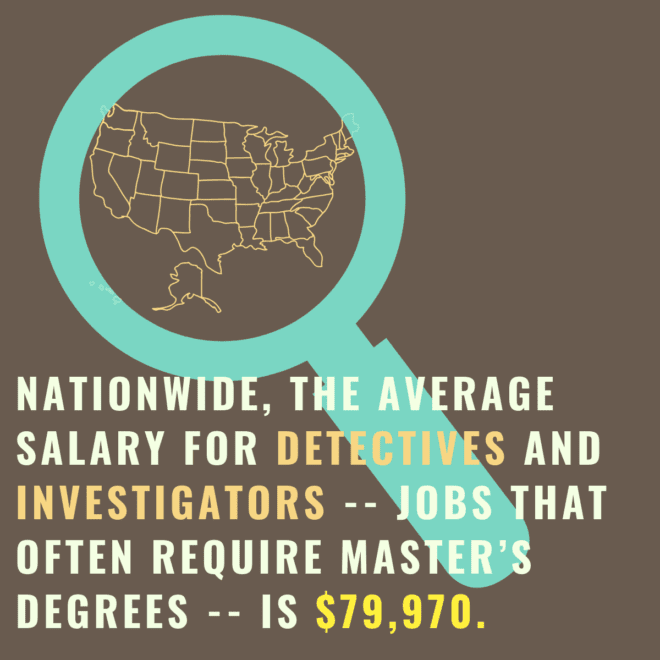
Obtaining a master’s degree in criminal justice related fields can open up a wide range of leadership and more technical positions in criminal justice. If you have a “dream job” that has seemed out of reach in the past, chances are that obtaining the proper master’s degree can help get your foot in the door.
If you think you might be interested in obtaining information on a master’s degree today, make sure to check out DegreeQuery’s ranking the best graduate degree programs in criminal justice.
Doctoral Degrees in Criminal Justice
Very few criminal justice jobs require doctoral degrees. But if you really want to advance the field of study in criminal justice, hold some of the most technical positions in the field, or reach top leadership ranks, a doctorate might be for you.
As with many fields, there are two doctoral degree types in Criminal Justice: a research doctorate track and a professional doctorate path. In criminal justice, Ph.D.’s are the research track. A Ph.D. in Criminal Justice requires at least 4 years of study with 2 or more working on original research for a dissertation. The primary objective of research track doctorates is to prepare recipients to teach at the university level and enable them to perform original research that advances their field of study.
The Doctorate of Criminal Justice (D.C.J.) degree is a professional doctorate, meaning that it is more applied and aims to prepare recipients for work outside of academia once it is completed. Though the D.C.J. also requires a dissertation, it holds a less prominent place in the course of study than in Ph.D. programs. Currently D.C.J. degrees require 3 or more years of study with just 1 or more focused on a dissertation (less than a Ph.D.).
Both are terminal degrees in criminal justice, and both may be used to become experts in a variety of criminal justice-related topics, or to assume the top levels of leadership in criminal justice fields.
If you think you might be interested in a doctoral program in criminal justice, be sure to check out our ranking of the best graduate degree programs in criminal justice today!
Can you get a criminal justice degree online?
Because criminal justice careers are often so “hands-on” many potential students wonder if they can get criminal justice degrees online. The short answer is that yes, you can obtain criminal justice degrees at every level online.
Though not for everyone, online degrees offer a variety of perks including the following:
Perks of Obtaining a Degree Online
- Flexibility in when you study and attend class (in many programs)
- Support for working adults and non-traditional students
- Work from any where
- No need to move for school
- Online Support Services
- The same degree as in-person programs
- Regionally Accredited Programs
If you think you might be interested in an online degree in criminal justice, be sure to check out DegreeQuery’s rankings of academic programs:
Online Criminal Justice Degree Rankings
- Top 10 Graduate Degree Programs in Criminal Justice
- What are the Fastest Schools to earn a Master’s Degree in Criminal Justice?
Criminal Justice Degree Specializations
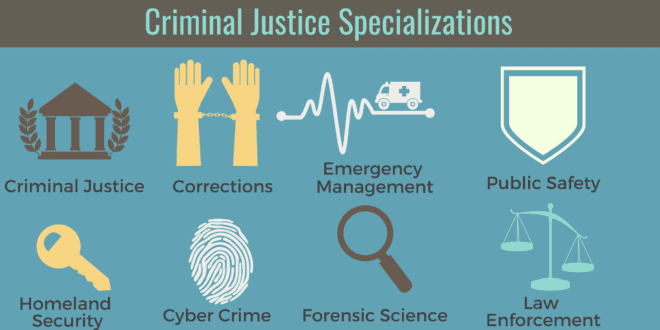
For many leaders in the field of criminal justice, a general criminal justice degree is just the beginning. While associates and bachelor’s-level criminal justice degrees can give graduates a solid footing in the field, at the graduate level (and sometimes at the undergraduate), students can begin to specialize. Below are the most common specialization paths related to criminal justice.
The first specialization within criminal justice is just that, a generalist track in criminal justice. Criminal justice is a vast field with plenty to learn without specializing in one area. Most bachelor’s degrees in criminal justice follow a generalist path. And some master’s-level programs also allow students to pursue a generalist path. These degrees help to make informed and well-rounded thinkers who can excel in officer roles, leadership within corrections or policing, or crime analysts.
One of the three pillars of criminal justice is corrections
Criminal Justice
Corrections
Emergency Management
Public Safety
Homeland Security
Cyber Crime
Forensic Science
Law Enforcement
Criminal Justice Jobs
As we’ve mentioned, criminal justice is a vast field with many opportunities. By learning on the job or pursuing one of the specializations listed above, you can open up a wide variety of career opportunities.
While there are too many criminal justice jobs to list here, below we’ll jump into some of the most common jobs within the three pillars of criminal justice.
Policing Jobs
Policing along with legal jobs constitute the single largest employment type within criminal justice. Policing can occur for public organizations such as a police department or Sheriff’s office, or may occur in private roles such as loss prevention or work as a private investigator.
In public settings, there are over 800,000 police and detectives, the largest single career type within criminal justice.
This group of jobs includes many roles other than staying on the beat and patrolling the streets, however. Policing work includes protective service officers, probation officers, crime analysts, and many more.

The entry-level degree for a police officer is a high school diploma and working through a police academy. You won’t find many police in leadership positions, however, without at least a bachelor’s-level degree.
The average pay for police is quite good for the required schooling with average wages of $30.27/hr or $62,960 a year. There’s definitely a range, however. The average pay for common policing roles are listed below:
- Police and sheriff’s patrol officers:$ 61,050
- Transit and railroad police:$ 70,280
- Detectives and criminal investigators: $79,970
- Detectives for the Federal government: $84,660
Jobs in the Court System
The court system is home to a wide range of criminal justice-related jobs.
And while some require you to show up in court every day, others are suited for the entrepreneurial or those looking to hire out their particular skill set. Private investigators and fraud investigators — who determine whether or not an insurance claim may be true — are two such roles. Lawyers and corporations often outsource this sort of work, but rely on information from parties such as these in proceedings within court.
More traditional court system roles include support staff for the court such as court bailiffs, security guards, paralegals, law librarians, and lawyers.
Criminal justice prosecutors are present in almost all criminal court proceedings. These individuals often work for the state or Federal Government, and are often elected officials. As all alleged criminals start their cases under the assumption of innocence, it is the role of criminal justice prosecutors to prove the guilt of the defendant.
On the other side of the aisle, criminal defense attorneys represent the defendant that is being charged with a crime by the state.
Both of these roles are crucial to upholding justice in the court section of the criminal justice world.
While criminal justice attorneys must hold a valid law degree (J.D.), many have also taken coursework in criminal justice. They are also aided in many cases by a wide range of investigators, lab technicians, and forensic experts that hold varying degrees of criminal justice credentialing.
Some of the most common criminal justice jobs in the court setting, as well as their average salaries, may be seen below:
- Criminal Justice Prosecutor: $65170
- Criminal Justice Defense Attorney: $78,500
- Court Bailiff: $39,840
- Paralegal: $52,188
- Insurance Fraud Investigator: $61,737
- Private Investigator: $45,610
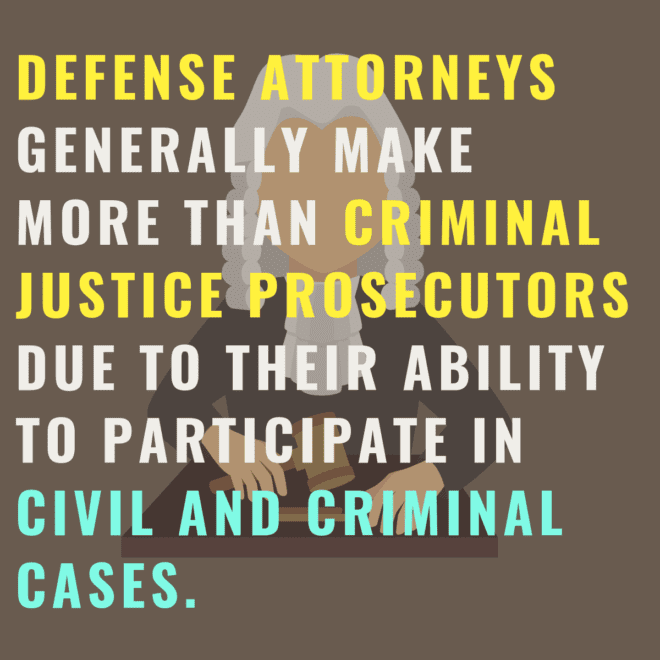
Jobs in Corrections
Ever heard of a classification officer? Well they’re the officers in charge of deciding just where the inmate who committed a petty theft, or a double homicide, is placed for their stay in prison. Classification officers, along with security guards, logistics managers, social workers, and more make up the wide array of jobs within corrections settings.
There are even jobs for chaplains, teachers, and librarians within corrections settings. And don’t forget that one of the eventual goals of corrections is to reintegrate inmates that have honored their debt to society, back into society. Probation officers along with social workers often help with ensuring inmates who have served their sentence can reintegrate back into the world. These are important roles, as recidivism — or the return of a one-time inmate to prison a second time — is a major challenge in criminal justice.
Below are some common jobs within the corrections portion of criminal justice, as well as average salaries.
Other Criminal Justice Jobs
There’s a whole world of criminal justice-related careers out there. And we’ve barely touched on private or governmental agency jobs. There are over 35,000 agents in the FBI alone, with close to 800,000 employees of the Department of Justice.

And let’s not forget that not all crime happens in physical space. Cyber crime is fast becoming one of the largest sources of stolen money and damages for many businesses. The Pentagon is one of the largest employers of cybersecurity professionals, with jobs also available at every corporation of any size. Though cyber security is often much more of a technical field than many other criminal justice fields, there are also roles in policy and policing involved. Pay is good in cyber security, with close to 1 million job openings unfilled as of the end of 2018.
Finally, there are many science and lab-based jobs integrally tied to criminal justice. Forensic psychologists, forensic analysts, blood spatter analysts, and lab technicians looking for a variety of chemical or biological markers in evidence are all very much a part of the criminal justice system.
For those holding skills in any of these fields and wanting to get involved in criminal justice, there are many hybrid roles in technology and science involved with criminal justice.
Some of the most common criminal justice jobs not in policing, the courts, or corrections can be seen below with their average salaries.
- Forensic Accountant: $78,845
- Cyber Security Analyst: $75,974
- Forensic Computer Analyst: $99,000
- Forensic Psychologist: $86,510
- Blood Spatter Analyst: $61,220
For Further Reading:
Top 10 Jobs with a Degree in Emergency Management
